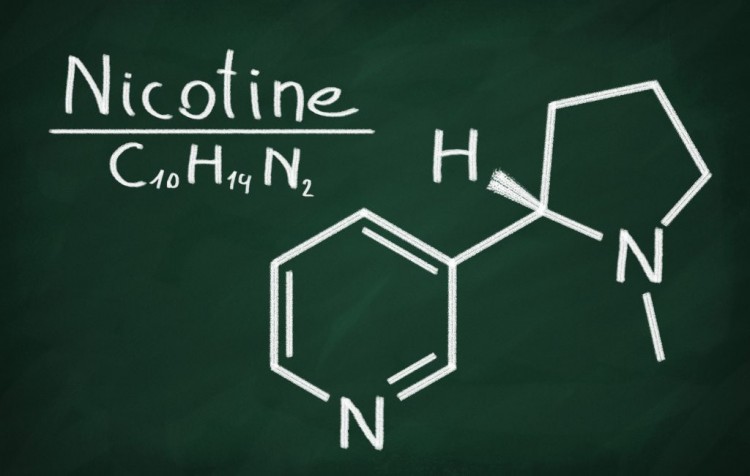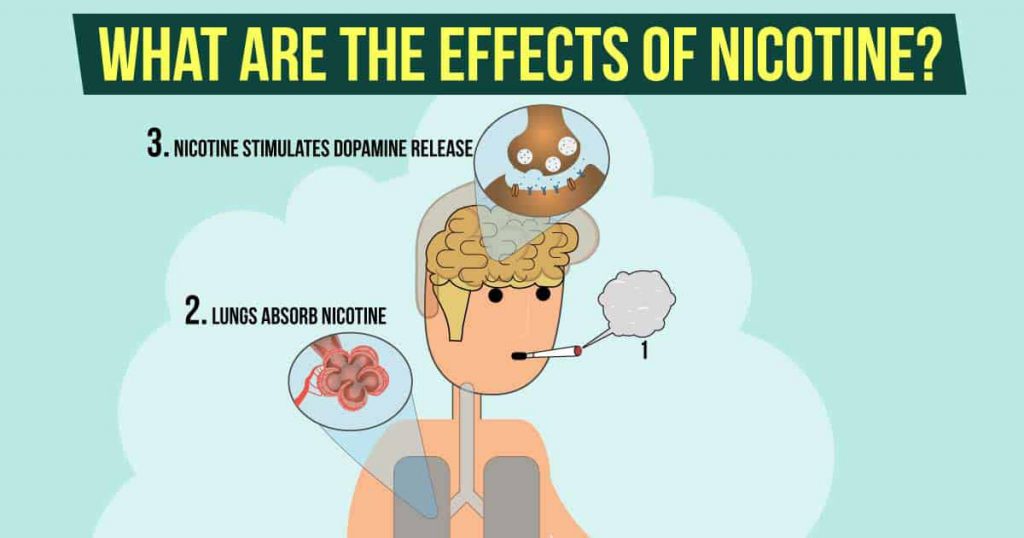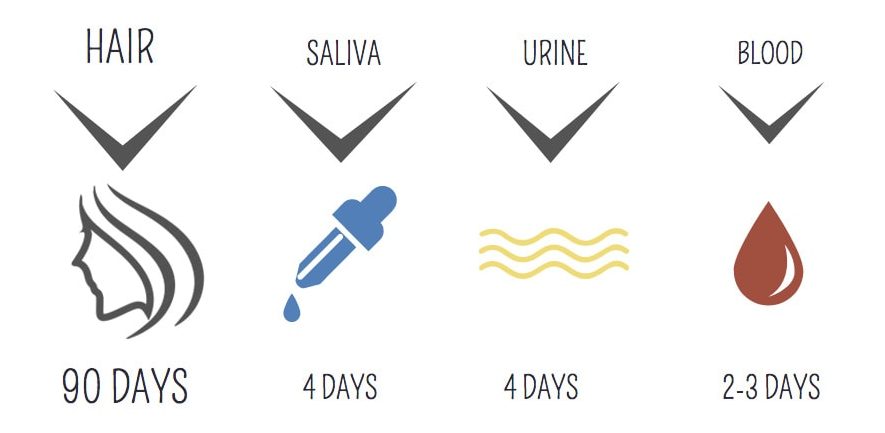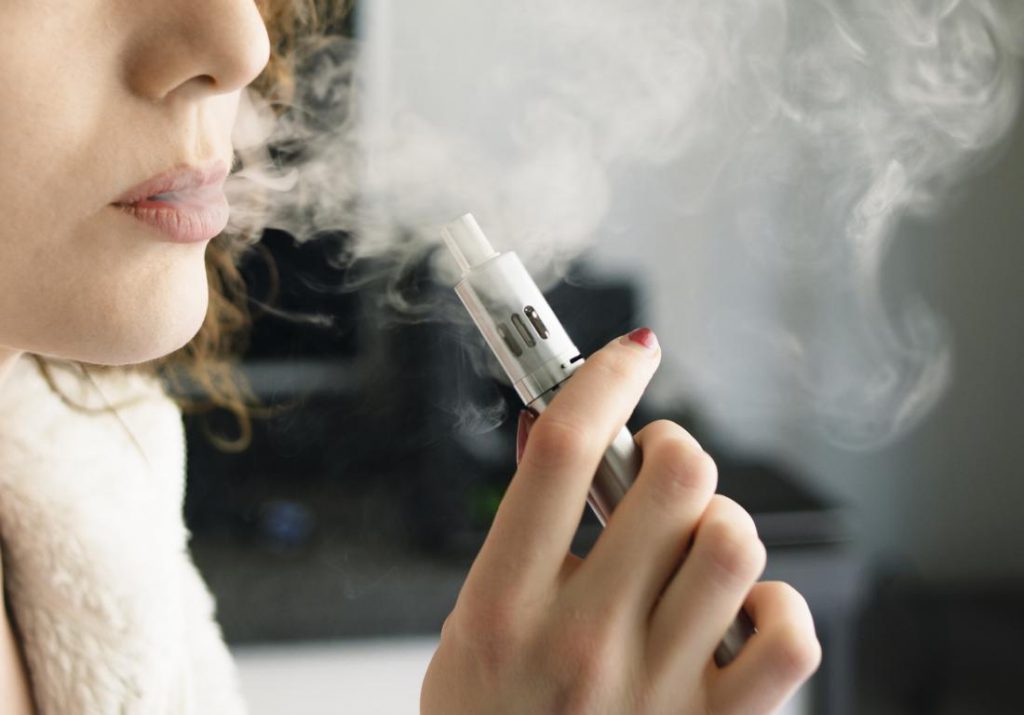All tobacco products including cigars, cigarettes, snuff, pipes, vape, e-cigarettes, and chewing tobacco contain nicotine. Nicotine, as most people know, is highly addictive and not many people can precisely answer the question, How Long Does Nicotine Stay in Yours System . To answer that question, let us first look at a few facts about nicotine.

Best Article About Marijuana Fact On 02- 2026
- How Long Does Nicotine Stay In Your System
- How to Clean a Bong
- How to Decarb Weed
- How to Roll a Joint
- How Much Nicotine is in a Cigarette
- How to Quit Smoking Weed
- Benefits of Weed
- How to Pass a Drug Test
- Why Does My Vape Taste Burnt
- Indica vs Sativa
- Is Weed Legal In California
- Marijuana Affiliate Programs
- How to Make Pot Brownies
- How Many Grams Are In An Ounce Of Weed
- How to Make Cannabutter
- What Is Rick Simpson Oil
- How to Roll a Blunt
- How Long Does Marijuana Stay In Your System
Some Best Nicotine test kit On Amazon 02- 2026:
[amazon bestseller=”Nicotine test kit”]What Is Nicotine?

Nicotine is an alkaloid compound found in some plants with the most predominant one being tobacco. The same compounds also appear in other plants such as tomato, potato, green pepper, and eggplant but in much lower quantities. Nicotine acts as a stimulant and people ingest it either through inhalation or by chewing it.
It has addictive properties that are hard to quit once you become too dependent on it. Scientists believe that smoking or inhaling nicotine releases dopamine, which is a “feel good” chemical to the brain, which makes it easily addictive.
People ingest nicotine in various ways. Some smoke it as a tobacco product such as the traditional cigarette, e-cigarette, VAPING, while others chew it either as tobacco , lozenges, gums or patches. Smoking nicotine absorbs into the body’s system through the lungs or the mouth and throat membranes. It can also enter into the body system through the skin or the gastrointestinal tract.
The liver, kidney and lungs do the hard work of metabolizing nicotine, and excretion of the same is by urination through the kidneys. Some of the nicotine in the system also leaves the body through feces. Other places besides the urine and blood where you can detect the presence of nicotine are the skin and hair.
With changing times, many companies today are testing new employees for nicotine in their system because of the costs that come with its addiction. There are various tests used to detect nicotine in the system. The test options are urine test, blood test, saliva test and hair follicle test. Determining how long it takes to detect the presence of nicotine in your body depends on the test option you choose.
Do you need drug testing advice? Check Here
How long nicotine detection tests take
Results for the presence of nicotine in the body vary depending with the test.
Urine test:
Testing for nicotine using a urine sample is one of the most common test options used by many people. The good thing with this test is that you can DIY from the comfort of your home or opt to go to a medical lab. Nicotine results normally take anything from 24 hours to five days. A urine test aims at measuring the amount of cotinine in the urine.
When you expose your body to nicotine, it produces a chemical known as cotinine. While nicotine may disappear from the body hours after quitting, cotinine remains in the system for more than a day or for a minimum 24 hours. The test has no risks.
Blood test
Although having a blood test is an intrusive testing method, it is by far the most accurate method of testing the amount of cotinine in your body. The test, done in a medical lab requires drawing your blood and waiting for results for anything from two to ten days.
Saliva test
This is also one of the easiest ways to detect the presence of nicotine in the body. All it requires is a swab of saliva from inside your mouth, carried out by a technician. The test results of the oral fluids for the presence of nicotine take anything from 24 hours to 72 hours.
Hair follicle test
If you have the right testing kits, you can easily carry out hair follicle nicotine test from the comfort of your home or you can opt to go to a medical lab for testing. The procedure requires the removal of some hair or just a small sample of hair and the results come out in one to five days.
[amazon box=”B004KAQ3RA” grid=”1″]How long does nicotine stay in the body?
After knowing the different testing methods now is the time to learn how long nicotine stays by testing it through the above methods.

How long nicotine stays in the blood
One hour after inhaling or ingesting nicotine, it will show up in your bloodstream. If you quit taking nicotine, it can still show up in your bloodstream for even up to ten days depending on various factors, which we will discuss in this article.
A blood test detects the existence and the amount of nicotine in your body. Nicotine blood tests have some of the most accurate and reliable results, unless the blood contains thiocyanate found in some medications and foods. This substance can give lead to false results.
How long nicotine stays in urine
Just as in a blood test, a urine test provides the information of the presence and amount of nicotine in your body system, after quitting nicotine, the same can still present itself in a urine sample after three weeks of the last puff. For some people, the substance stays in the urine for two to seven days for non-heavy and second hand smokers while for heavy smokers, the levels can stay in the urine for two to three weeks weeks.
The results may also depend on where your present your urine sample and the last ingestion of nicotine. If you are still a smoker, the results may present themselves as positive with 1,000 Nano grams per millimetre. If you are a passive smoker and you have been off nicotine for the past two weeks, the results may be positive at 30 Nano grams per millimetre. Before presenting the results, it is always good to discuss them with the doctor or technician because labs have different reference ranges.
How long nicotine stays in saliva

Testing the levels and the presence of nicotine using a saliva swab is still one of the quickest detection methods. Though the body excretes, nicotine within the first twenty minutes, usage and amounts of the same still lingers in the body and this comes up through testing. After you quit smoking, a saliva swab can detect nicotine within twenty-four hours.
The saliva swab, mixed with cotinine reveals the amount of nicotine in your system. The same can remain in your saliva for up to twelve hours for light smokers. For heavy smokers, the presence of nicotine can remain in saliva for four to five days. A saliva test can detect nicotine levels of between zero and 2000 ng/ml. this is a much lower level detected by a urine sample.
How long nicotine stays on a hair follicle
Testing the presence of nicotine in hair is one of the most reliable detection methods but the most difficult one. It is also slow and expensive and the reasons why many people prefer any of the other three testing methods. Though you can get kits to help you carry out the test from the comfort of your home, it is always advisable to do it under the supervision of a professional so that they can explain the results. The average time it takes hair to retain cotinine is three months.
What factors influence how long nicotine stays in your body?
The longevity of nicotine in the body varies from person to person depending on several factors. These factors are the reasons why some people stay for as short as four days after quitting while others take months for nicotine to disappear from their body system completely.

Frequency of nicotine intake
Your smoking habits determine how long your system rids itself of nicotine and cotinine. Smokers come in three categories. We have the light users, moderate users and the heavy users. Light users are those that smoke maybe once or to the most twice a week.
Moderate smokers inhale or ingest nicotine three to four times a week while the heavy users are those that smoke daily. For light users, nicotine gets out of the system in two to three days after quitting while for moderate users it takes a little bit longer. For heavy smokers, the presence of nicotine stays in the system for anything from six to one year or slightly more after quitting,
Physiological factors
Physiological factors includes age, genes and hormonal changes and levels in the body. Younger people tend to rid their systems of nicotine much faster than older people do. This is because as your body organs get older, it becomes more difficult for them to excrete nicotine and other toxins.
Women, especially the pregnant ones tend to rid their bodies of nicotine faster than men do because they have more oestrogen levels. When it comes to genes, research shows that Hispanic and Caucasians metabolize nicotine better and faster than Africans, Asians, Asian Americans and African Americans.
Medication
Some of the drugs whether prescribed or OTC drugs can also have an effect on how long nicotine stays in the system. Phenobarbitals and antibiotics increase the body’s metabolism process, which makes it easier to rid the body of nicotine.
You however have to note that not all of them are capable of doing this. Other drugs such as hypertension medication and antifungals slow down the metabolism process, which in turn increases the chances of nicotine not excreting the body fast.
Body mass
Your body mass also affects how fast you can get rid of nicotine from the system. When you smoke, nicotine stores itself in the fatty tissues of the body. Leaner people with no fatty tissue therefore excrete nicotine faster than fat and obese people do.
Exercise
People that are not physically active will not excrete nicotine faster as compared to physically active people. The more you exercise your body, the better your metabolism process gets and the faster the excretion process.
Hydration
Stay hydrated at all times if you want to clean your system of nicotine and other toxins. Water helps to speed up expulsion of nicotine, which allows you to have shorter days with the same in the body system.
Kidney and liver functions
The liver and the kidney are two of the major body organs that get the blunt of nicotine inhalation. They also play the biggest roles in getting rid of toxins in the body. If the organs are not functioning well, then chances rare nicotine will not leave your body fast enough.
Most frequent asked questions
We now look at some of the most FAQs concerning nicotine and addiction
Is vaping and using e-cigarrete as dangerous as smoking a regular cigarette?
Today many people especially the younger generation are turning away from the traditional cigarettes to embrace vaping and e-cigarrete. The belief in some of these people is that e-cigarrete and vape pose less danger than the real cigarrete. This is however far from the truth because e-liquid is vaporised nicotine, which is as bad as tobacco nicotine.
One of the things that attract younger people to vaping or e-cigarettes is the different flavours they come in and the hype that goes with using these products. Some of the e-cigarettes look like actual cigarettes while others look different. The devices do not use tobacco but use cartridges that have chemicals and nicotine.
Majority of these chemicals are toxic and their toxicity varies from product to product. Even if some people choose to vape in order to stop smoking the traditional cigarettes, the move does not help much because eventually it leads to nicotine addiction.
What are the side effects of nicotine leaving your body?
One of the reasons why many people keep smoking, vaping and chewing tobacco is because of the nicotine content. With time, they become addicted to the stimulant effects of the substance. Taken in small doses, nicotine gives the same feeling of relaxation that comes with taking other drugs such as cocaine or WEED or even a cup of coffee.
With time, many people become accustomed to the good feeling that they increase their intake of nicotine. Once this happens, they start to depend on it for relaxation and a means to decrease their anxiety and tension. Withdrawing or reducing the intake for these people causes withdrawal symptoms that include
- Fatigue
- Headache
- Lack of concentration
- Constipation
- Intense cravings for nicotine
- Depression
- Anxiety
- Insomnia
- Hunger pangs
- Nausea
- Frequent headaches
- Irritability
- Diarrhoea
During the first few hours after quitting, the withdrawal symptoms are at their worst levels. If you persist and do not indulge in a smoke, the symptoms become less in the first three days. the severity of the symptoms also depend on factors such as how long you have been a smoker, the types of vape and tobacco products you have been using and how frequently you smoked.
Is it easy to get nicotine completely out of the system?
Some people worry that maybe even after quitting, it is not possible ti get rid of nicotine from their body systems completely. This is not true because you can clear nicotine out of your system if you quit and abstain from all nicotine products. To speed up the process of cleaning your body system, you should do several things such as;
Hydrate your body
It is very important to stay hydrated at all times because water helps to clean the body of all toxins. the same, toxins and nicotine leave the body through urine and sweat which is the reason you should make it your first body system clean up activity.
Regular exercises
Exercising builds up the body’s metabolism by increasing its rate. This helps you to burn up your nicotine levels faster through sweat. For those that just quit and relax without exercising their bodies, then nicotine and its by-products may stay in the set longer. Exercising also helps to burn up fatty tissue that store nicotine.
Healthy diet
Diet plays a major role in increasing the body’s metabolism rate. Eat more foods rich in antioxidants that help to boost the body’s metabolism. Such foods include fruits and foods that contain fiber. Avoid fatty foods and those with too much carbs because they slow down the metabolism rate.
NRTs
You can also turn to Nicotine Replacement Therapy to help you to do away with the cravings and recover from your addiction. What NRT does is to provide your body with the nicotine it craves for. It is safer to use than the real nicotine and with time, the cravings start to diminish. NRT therapies include the use of inhalers, gums and patches. Other alternate therapies you can use to help with the cravings are meditation, acupuncture and hypnosis.
How To Quit Weed Without Withdrawals Or Sleepless Nights:
What are the dangers of nicotine?
When people start smoking and vaping, many of them probably do not intend to becoming addicted to the stuff they smoke. With time, they realise that the cool thing they were trying out is addictive. The good thing is that every packaging of a cigarette pack or a vape container comes with a warning that nicotine is addictive and dangerous to your health.

Therefore, with this knowledge one cannot say that the people that get addicted are ignorant. They just become too dependent on nicotine that it becomes hard to quit. The dangers that come besides addiction, the other dangers that come with having nicotine in your body system are:
- Impairment of brain development in adolescents
- Lung disease
- Bronchitis
- Lack of appetite
- Insulin resistance for people with diabetes
- Increased heart rate
- Increase in blood pressure
- Narrowing of arteries leading to an irregular flow of blood to the heart
- Cause a danger to second hand smokers, which may lead to respiratory infections
- Sleep disturbances
- Tension, anxiety and depression
- Restlessness, frustrations
- Frequent headaches
- Cancer
Are there any health benefits of nicotine?
Nicotine is the largest tobacco constituent and many people associate it with harm, addiction and many health problems that cost them a lot of money to find cures. Majority of the health problems that occur because of smoking are associated with this substance, yet some studies show that nicotine actually has some health benefits.
The argument is that people tend ti ignore the benefits and dwell only on the negatives which may not even be the real case, this is however debatable because these benefits are not FDA approved. Some of the benefits of nicotine that many people and organisations probably overlook are;
- Using nicotine may prevent people from developing Parkinson’s disease
Though this has only been tested on animals, there is a strong belief that nicotine facilitates some growth factors in the brain that reduce degeneration of neurons that cause Parkinson’s disease.
- It improves memory and attention in people with cognitive impairments
- It helps with depression
- It enhances attention and alertness
- Helps in relaxation
- Helps to burn body fat
You have to note that all the above benefits are still under research and they are in no way a way of encouraging you to take nicotine in large amounts.
Does marijuana contain nicotine?
Many people ask this question because of the high that comes with smoking marijuana. However, the truth is that CANNABIS does not contain nicotine but it contains THC , CBD and other active ingredients. THC, which is the main ingredient, gives you a high but is not as addictive as nicotine. CBD on the other hand comes with immense and approved health benefits. In recent times, mixing nicotine with marijuana to create blunts and spliffs that cause addiction is probably one of the reasons some people tend to think that weed contains nicotine.
Wrapping it up
Quitting nicotine is easier said than done as the journey to do so is a difficult one, however if you try harder, follow the right ways to try and beat the addiction, then you can have nicotine out of your system within the shortest time possible. If you feel that you cannot manage to do it by yourself, it is okay to seek help from friends and by adopting nicotine replacement therapy though more people today especially the younger generation, are turning into vaping rather than smoking cigarettes, the practise is also not free from addiction and other ills that come with inhaling harmful substances.
For some nicotine, resistance is a life long struggle that takes years to kick off completely even after quitting. With determination and sheer power, anyone can fight the addiction. We hope this article has helped you in learning things about nicotine that you did not know. Leave a comment or ask any question and we will get back to you. In addition, if it helps, you, do not forget to share the same with a friend or family member who could be struggling with nicotine addiction.
[amazon bestseller=”nicotine test kit vape”]








